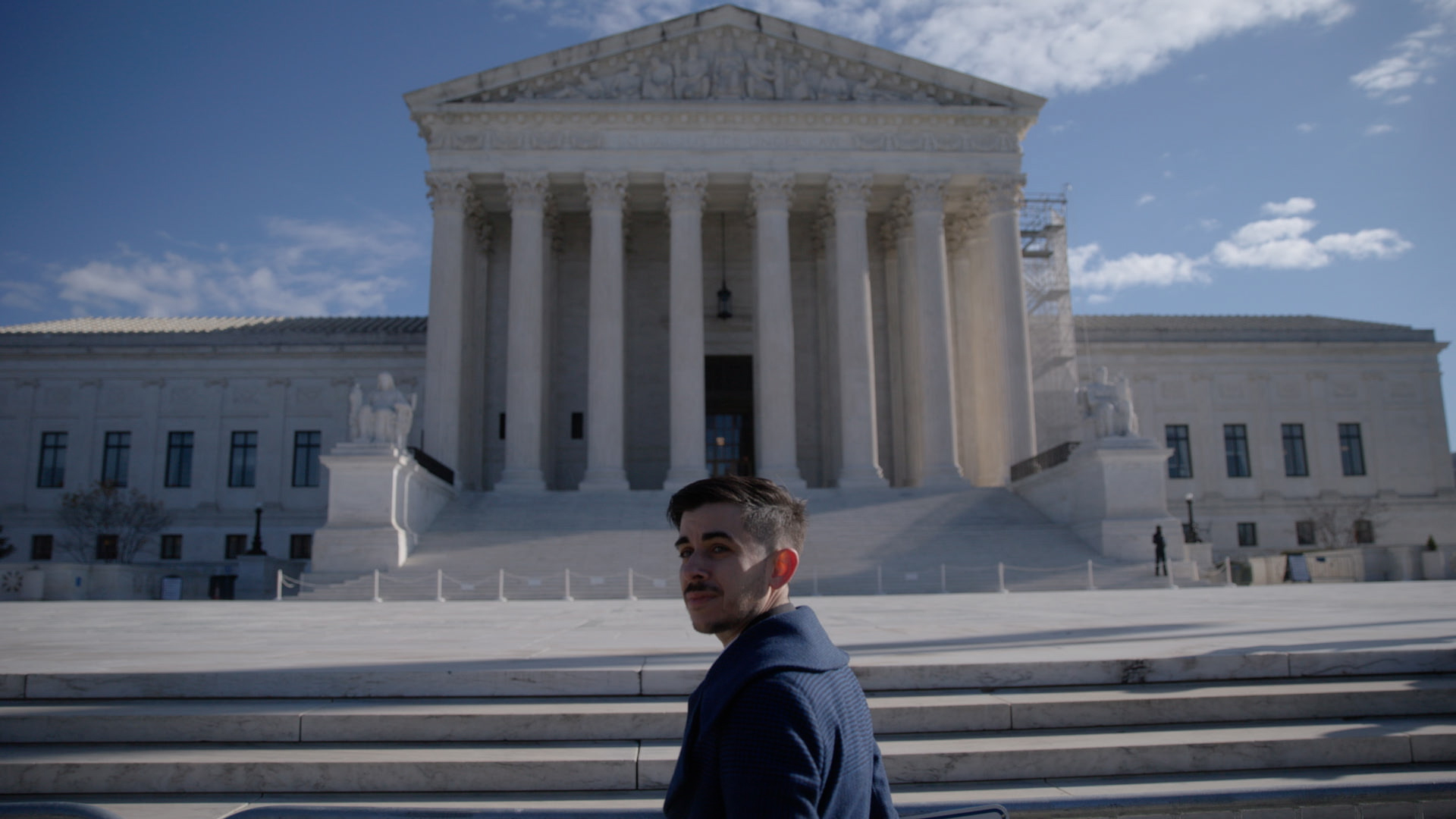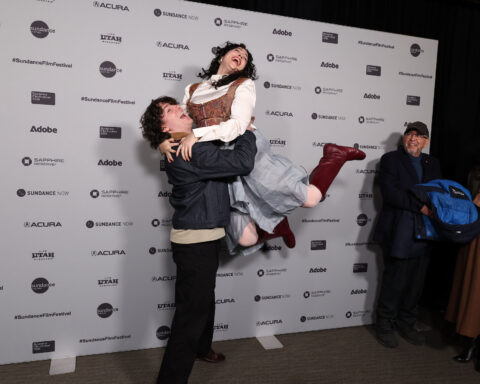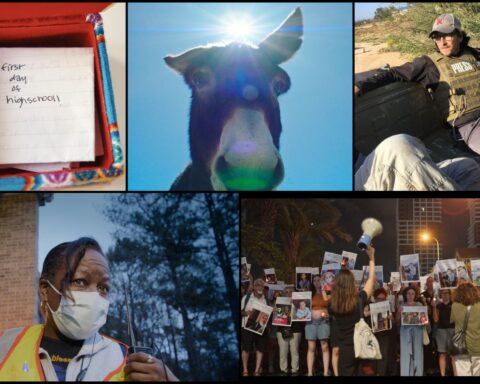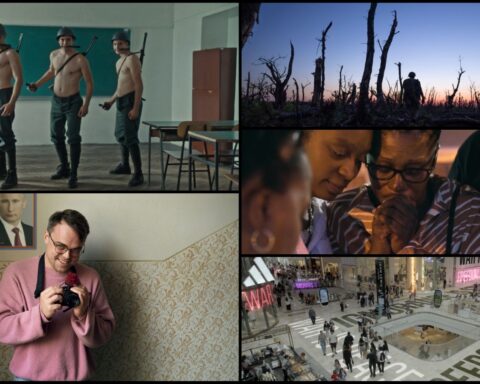“I felt like this story had to be out there as soon as possible because people were getting harmed in real time because of what the mainstream media was doing,” says Heightened Scrutiny director/producer Sam Feder. “That was really the aha moment: the urgency around telling the story.”
Feder, speaking with POV via Zoom, explains how their timely documentary came to follow Chase Strangio of the American Civil Liberties Union (ACLU) as he prepares to become the first transgender lawyer to argue a case before the Supreme Court. Strangio’s case, US v. Skrmetti, seeks to overturn Tennessee’s ban on gender-affirming care for transgender youth. The case presents a potentially grievous precedent should the court uphold it. Such a decision risks enabling discrimination on the basis of sex, therefore making it a dangerous ruling for anyone in America.
However, Feder says they came to Strangio’s case while conducting interviews about the harmful narrative being spun about transgender people in journalistically suspect outlets like the New York Times. Feder explains that film’s initial interviews began in March 2024, months before the Supreme Court or Strangio took the case, as they were conceiving a follow-up to their 2020 documentary Disclosure about the rise of trans visibility. “We were concerned there’d be a backlash, and we started seeing a shift in the mainstream media that was seeming to lead up to the backlash,” says Feder. “We wanted to dig in and see what had happened and see where it was going, and then we all know where it landed.”
These interviews with LGBTQ+ activists, many of whom are trans, expand the conversation about the Skrmetti case into one about trans rights more broadly. They tell how inaccurate and biased articles, many of which are opinion pieces, serve as evidence in legal briefs including the Skrmetti case. In short, fearmongering anti-trans journalists pen fear-mongering op-eds that quickly become authoritative sources for under-informed lawyers.
“During my research, I started seeing how legal briefs were citing the New York Times,” says Feder. “They were citing the Wall Street Journal, they’re citing The Atlantic, and that was terrifying. I think that’s largely why we made the film so quickly.” Heightened Scrutiny premiered in January 2025 at the Sundance Film Festival, just a month after Strangio finished arguing the case before the Supreme Court.
With Strangio among the preliminary interviewees, Feder notes that their conversations around media made the case a logical narrative thrust. “I was looking for a storyline to help the film be more grounded in material consequences and grounded in the people, because these interviews are brilliant humans talking about journalism, the law, and personal stories,” says Feder. “But we needed to see more of how this affected people every day. Chase’s story and Mila’s story are so compelling and grounded and beautiful and emotional. They give you access to see how the real life repercussions of the bias and media.”

The story of Mila, a 13-year-old trans girl in New York, succinctly grounds Heightened Scrutiny in the immediate consequences of not only this case, but the weaponized reporting about trans kids. Moreover, Mila allows a young voice to articulate a kid’s sound understanding of what gender-affirming care means for her body as it grows. The storyline echoes Strangio’s case as it specifically deals with puberty blockers, which simply delay the onset of puberty before bodily changes reflect a gender with which one doesn’t identity, and hormone therapy as forms of gender-affirming care for young people.
“I had been going to these school board meetings that Chase had been organizing with some other people because school boards were actively promoting anti-trans bias. The students and their parents and their friends really wanted to push back,” explains Feder. “There was a resolution that had passed that they were trying to get rescinded, so Chase and some other people were reaching out to trans adults to come and show their support.”
Feder adds that Mila actually introduced herself to the film team. At a June 2024 meeting, Feder says they walked into the school with cameras and saw Mila and other kids making posters. “Mila comes out of nowhere, runs up to me and my cameraperson and says, ‘You have my permission to film me,’” laughs Feder. “Working with Mila came about after a lot of considerations about what were the best ways to include young people’s voices because there’s this national debate about young people, yet they were never given a chance to speak for themselves.”
She’s a passionate and unapologetic advocate, but the students’ arguments and those of community members generally fall on deaf ears as school board representatives simply use the town hall as an opportunity to catch up on emails. She and others make their cases, often asking the adults to put down their phones and listen.
“When we captured Mila, we realized what a star she is in terms of being able to show what it means to be a young trans person trying to make her way in the world with her family supporting her,” adds producer Amy Scholder. “We really needed to keep to this as spine of the film.”
“It was many years of process [transitioning] with her and her family,” says Feder. “She tells a story about how she was five years old and she just started to want to wear girls’ clothes. And then it was many years later until there was any medical intervention and the medical intervention was simply puberty blockers to give them more time. There’s so many people I’ve spoken to who are questioning children’s access to medicine, and they don’t know about puberty blockers. When I tell them about puberty blockers, suddenly they’re like, ‘Maybe it isn’t dangerous. Maybe I should rethink my position on this.’”
Mila’s voice ultimately becomes an equal to Chase’s as Heightened Scrutiny reaches the climactic day of the Supreme Court case. Audio excerpts from the case insert Strangio’s voice as he answers the justices’ questions. Mila, meanwhile, helps rally a crowd outside the Court where activists show their support.
Feder says it was inspiring seeing the crowd that day transform the square into a dance party. “I remember turning to Amy being like, ‘How could people hate us? How are we a threat?’ We were the elders of the crowd, so you start to feel protective of these young people who are just putting themselves on the line and they are also dancing,” says Feder. “And then next to us were the haters. Marjorie Taylor Greene was screaming into her microphone when Mila was giving her speech. It took a lot of audio work to cut out Marjorie Taylor Greene’s voice. We didn’t want to give much airtime to the haters in the film, but they were all there next to us.”
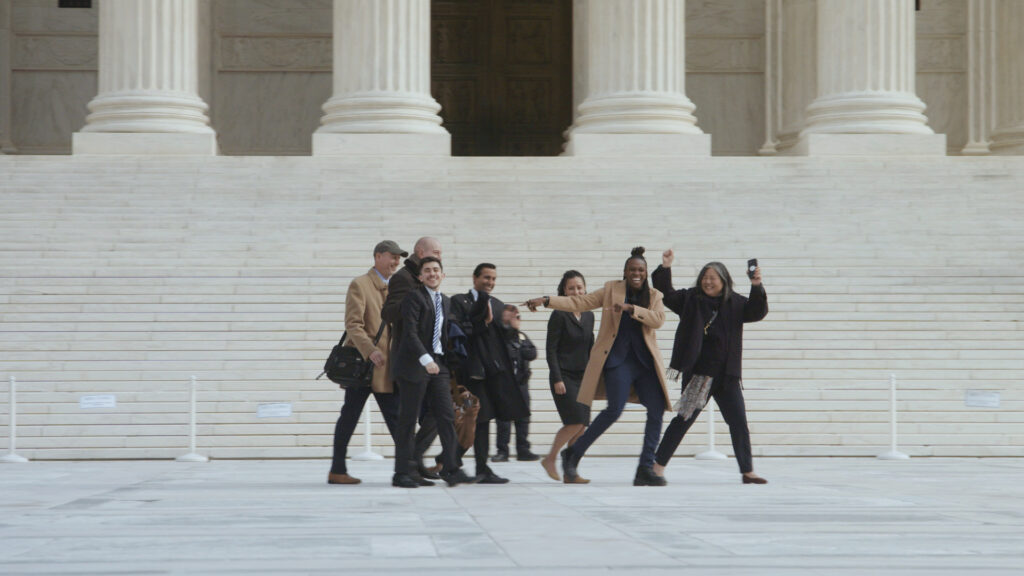
“There was something so disarming about seeing the community coming out to support Chase and be there when the ACLU got out of the courthouse,” agrees Scholder. “There was all of this love and support for people being allowed to live their truths. It was so palpable that the other side was just hate. They were just antis. They weren’t for anything. It was so hard to understand how they could get up in the morning and go out into the freezing cold all in the name of trying to stop people from living their lives. It felt so stark, the contrast, and the fact that there was this DJ playing music and we could let loose and find some fun and joy in each other, and there was no parallel. On the other side, there was dour Christian music and no smiles.”
But Feder says the most hurtful presence of the “no smiles” camp came from members of the queer community who showed up to protest against trans rights. “We know that there are people within our queer community who are not embracing trans people, but seeing it that day, seeing gay men and lesbian women holding signs and shouting hate towards trans people, that hurt on a real deep level,” says Feder. “Accusing us of being homophobic because why else would we have transitioned—these old tired accusations and they thought they were doing right by people. That hurt.” Feder’s observation echoes the sentiments that interviewees like Gina Chua, Jelani Cobb, and Laverne Cox give in Heightened Scrutiny while reflecting upon the weight of countering these myths daily.

Heightened Scrutiny finds a cautiously optimistic tone as it ends with the rally paired with Strangio’s arguments. That joy assumes a different meaning now, though, after the Supreme Court released its opinion on June 18 and upheld the Tennessee board’s decision. Feder says that it was important to get Heightened Scrutiny to audiences while deliberations were ongoing so that the documentary could be a tool for raising awareness. They note that the verdict only amplifies the urgency to continue the conversation that’s begun since the film premiered. Heightened Scrutiny underscores how the ruling could have repercussions as United States vs. Skrmetti has echoes of anti-segregation and gender discrimination laws, and obvious implications for diversity, equity, and inclusion initiatives.
“It’s all the more important for people to know that this has happened and it is not going to stop the trans people,” says Feder. “I think that’s really lost on the population. If you don’t care about trans people, that’s fine—I don’t need everyone to care about us—but at least care about yourself because your rights are directly going to be impacted by this case. When anyone’s bodily autonomy is chipped away at, everyone’s bodily autonomy is going to be chipped away at.”




